The following lists events that happened during 1853 in South Africa.

Francis William Reitz, Jr. was a South African lawyer, politician, statesman, publicist, and poet who was a member of parliament of the Cape Colony, Chief Justice and fifth State President of the Orange Free State, State Secretary of the South African Republic at the time of the Second Boer War, and the first president of the Senate of the Union of South Africa.

The Iziko South African National Gallery is the national art gallery of South Africa located in Cape Town. It became part of the Iziko collection of museums – as managed by the Department of Arts and Culture – in 2001. It then became an agency of the Department of Arts and Culture. Its collection consists largely of Dutch, French and British works from the 17th to the 19th century. This includes lithographs, etchings and some early 20th-century British paintings. Contemporary art work displayed in the gallery is selected from many of South Africa's communities and the gallery houses an authoritative collection of sculpture and beadwork.

Riversdale is a town located along the N2 highway, within the Hessequa region between Cape Town and George on the Agulhas Coastal Plain of the southern Western Cape province of South Africa. It is an agricultural service oriented town, being a hub for shopping and other services for surrounding farming communities, smaller towns, and coastal resorts, like Witsand and Stilbaai. It is located beneath the imposing Langeberg Mountains to the north, with Sleeping Beauty Mountain Peak overlooking the town. The town is home to the second largest collection of Thomas Bowler paintings within South Africa and is also the only town in the country, in which you would find a Ukrainian Museum of Culture. Riversdale links with the Klein Karoo, via the tarred Garcia's Mountain Pass, which offers traditional Karoo landscapes and wide open spaces for motorcyclists.
George Milwa Mnyaluza Pemba was a South African painter and writer. He was posthumously awarded the Order of Ikhamanga.

Irma Stern was a major South African artist who achieved national and international recognition in her lifetime.
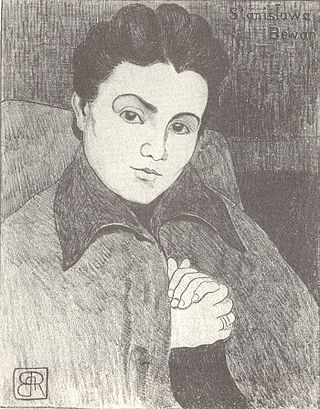
Stanisława de Karłowska was a Polish-born artist who was a founder member of the London Group. Her work combined a modernist style with elements of Polish folk art.
The William Humphreys Art Gallery, in Kimberley, South Africa, was opened in 1952 and named after its principal benefactor, William Benbow Humphreys (1889–1965).

Jan Vermeiren lives and works in South Africa as a painter and printmaker.

Maurice van Essche was a Belgian-born South African artist and art teacher who achieved national and international recognition in his lifetime.
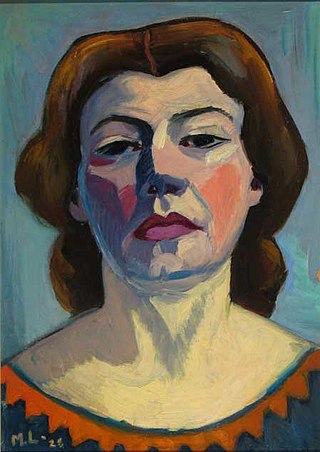
Maria Magdalena Laubser was a South African painter and printmaker. She is generally considered, along with Irma Stern, to be responsible for the introduction of Expressionism to South Africa. Her work was initially met with derision by critics but has gained wide acceptance, and now she is regarded as an exemplary and quintessentially South African artist.

Wolf Kibel was a South African painter and printmaker. He was partly responsible for the introduction of Expressionism to South Africa. His paintings and monotypes have earned him recognition as a sincere and gifted artist.

Christo Coetzee was a South African assemblage and Neo-Baroque artist closely associated with the avant-garde art movements of Europe and Japan during the 1950s and 1960s. Under the influence of art theorist Michel Tapié, art dealer Rodolphe Stadler and art collector and photographer Anthony Denney, as well as the Gutai group of Japan, he developed his oeuvre alongside those of artists strongly influenced by Tapié's Un Art Autre (1952), such as Georges Mathieu, Alfred Wols, Jean Dubuffet, Jean Fautrier, Hans Hartung, Pierre Soulages, Antoni Tàpies and Lucio Fontana.
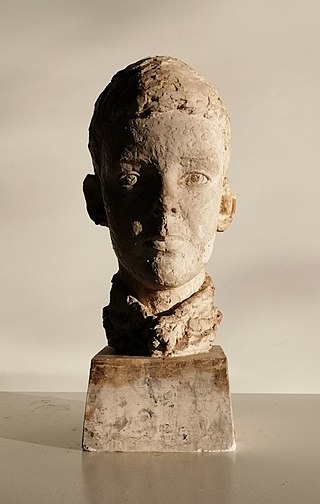
Moses Kottler (1896–1977) was a South African painter and sculptor. He is widely regarded, along with Anton van Wouw and Lippy Lipshitz, as one of the most important South African sculptors. This triumvirate had the distinction of also having excelled at using pictorial media; Lipshitz with monotypes and Van Wouw in painting and drawing. Kottler's work in oils earned him additional consideration as a painter.
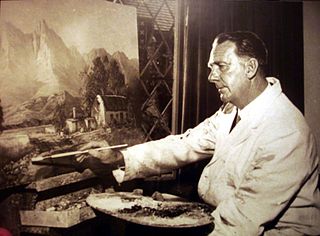
Gabriel Cornelis de Jongh was a Dutch-born South African painter.
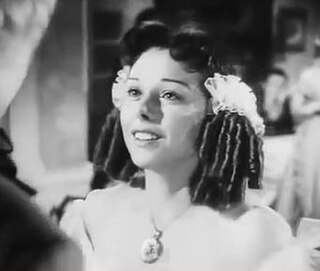
Olga Edwardes was a South African-born British actress and artist.
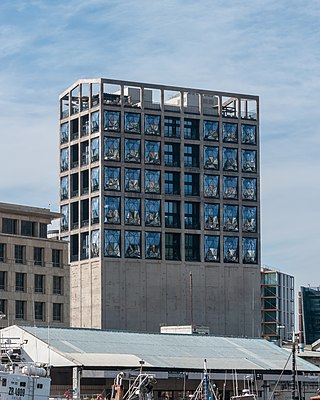
Zeitz Museum of Contemporary Art Africa is a public non-profit museum in Cape Town, South Africa. Zeitz MOCAA opened on September 22, 2017 as the largest museum of contemporary art from Africa and its diaspora. The museum is located in the Silo District at the Victoria & Alfred Waterfront in Cape Town. A retail and hospitality property, the Waterfront receives around 24 million local and international visitors per year.

The Garcia's Pass is a mountain pass across the Langeberg in the Western Cape province of South Africa, with its highest point at 548 m (1,798 ft) altitude. The regional road numbered R323 uses this pass on its leg between Riversdale in the south and Ladismith in the Little Karoo to the north. From Riversdale, the road winds to the Garcia Pass across the Langeberg to Muiskraal in the northern foothills. The maximum slope is 1:14 on the southern descend.
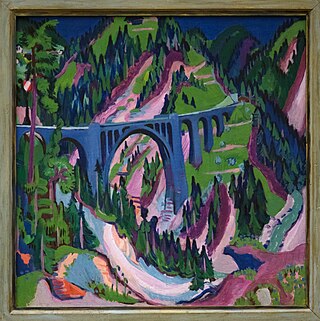
The Bridge near Wiesen, also known as The Bridge at Wiesen, is an oil-on-canvas painting by the German painter Ernst Ludwig Kirchner, from 1926. It depicts the Wiesen Viaduct, south of Davos, in Switzerland. It is signed on the bottom right of the center and is dated '26' on the back. The painting is held at the Kirchner Museum Davos.


















